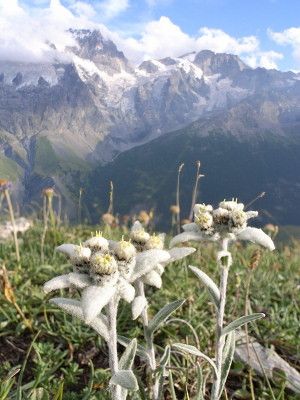Edelweiss, edelweiss —
Every morning you greet me.

The common name comes from German edel, meaning “noble”, and weiß (also spelled weiss) “white”, thus signifying “noble whiteness”.[2]
The scientific name Leontopodium is a Latin adaptation of Greek leontopódion (λεοντοπόδιον) “lion’s paw”, from léōn “lion” and pódion “foot” (diminutive of poús, podós “foot”).[3]
The Romanian name, floarea reginei,[4] means “Queen’s flower”. Also, another common name is floare de colţ which means “mountain flower”.
The Persian name is gol-e-yax, which translates as “ice flower”
Wiki
Small and bright, clean and white —
You look happy to meet me.
Cold-adapted alpine plants such as the edelweiss, made famous by Julie Andrews in The Sound Of Music, could be lost to future generations, scientists have warned.
They are already being squeezed out of their habitats by plants that thrive in warmer temperatures, it is claimed.
Within a few decades some alpine meadows could disappear altogether, according to the first pan-European study of changing mountain vegetation.
Blossom of snow, may you bloom and grow —
Bloom and grow forever.
The Scotsman is one of the news services which noticed this story:
A study, involving biologists from 13 countries, revealed that climate change was having a more serious impact on alpine vegetation than they had expected.
The first cross-Europe survey of changing mountain vegetation has showed that some could vanish within decades.
Michael Gottfried, of the Global Observation Research Initiative in Alpine Environments (Gloria) programme, said: “Many cold-loving species are literally running out of mountain. In some of the lower mountains in Europe, we could see alpine meadows disappearing and dwarf shrubs taking over within the next few decades.”
The Gloria team, led from Austria, analysed 867 vegetation samples from 60 different summits across Europe, including in the Cairngorms in Scotland.
They compared results from 2001 and 2008 and found strong evidence to suggest cold-loving plants were being pushed out by species that preferred warmer conditions.
Among species at threat in Europe could be the edelweiss, praised in the song of the same name in The Sound of Music. It is specially adapted to the high-life at altitudes of between 6,500ft to 9,500ft. Its snow white, star-shaped leaves are covered in woolly hairs to protect them from the cold.
Link
Edelweiss, edelweiss —
Bless my homeland forever.

When my daughter was 7 years old, she loved to sing that song.
Blossom of snow, may you bloom and grow —
Bloom and grow forever.


